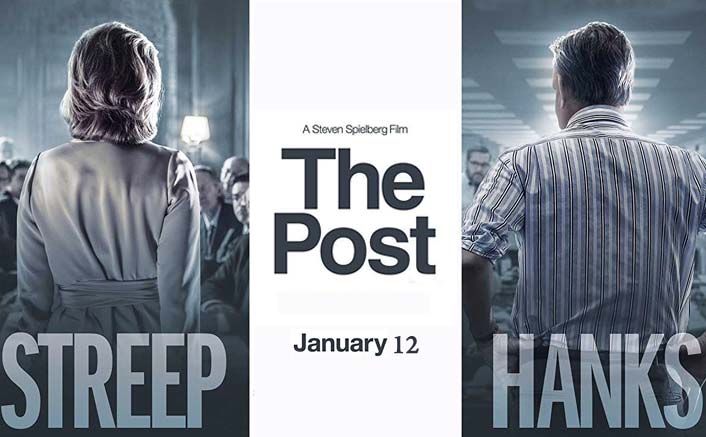Home » Posts tagged 'The Post'
Tag Archives: The Post
Review of the Year – Part One: Award Season
The start of the movie year is largely filled with awards contenders, and as a fan of awards I make a point of seeing as many of the nominees as I can. Kicking off 2018 for me was the film best known for a sudden recasting, as Ridley Scott’s All The Money In The World featured the removal of Kevin Spacey and rapid replacement with Christopher Plummer. While the film itself is competent if uninspired, the willingness of the filmmakers, especially Scott himself, to engage with and take seriously the debates over appropriate behaviour make this film something of a landmark. And Mr Plummer did not do too badly, earning an Oscar nomination for his trouble.

All The Money In The World did not concern the Academy members otherwise, nor indeed did one of the Best Picture nominees, The Post. Nominated for Best Picture and Best Actress (21 nominations, Meryl, really?), The Post was nonetheless a gripping, urgent and timely tale of the importance of the press as well as being a significant story of female empowerment. However, it was a rather safe film in terms of awards attention, so I was pleased to see other films honoured.

Another safe bet, which did pick up some awards, was Darkest Hour, with Gary Oldman and a tonne of prosthetics bringing Winston Churchill to quivering yet unwavering life. I found Darkest Hour a patchy film, but there is no denying the strength of Oldman’s performance.

Two of the nominees for Original Song I missed on their original release but caught up with later. The first of these, The Greatest Showman, proved a hollow effort that raised interesting ideas which then got lost in the seemingly heady rush to the end for, well, not much. Far more rewarding was Coco, a charming, funny and yet bittersweet tale that not only picked up the Oscar for Original Song, but also continued Pixar’s triumphs in the Animated Feature category.
I count four of the Best Picture nominees in my top films of the year, and had a tough time picking which I wanted to win. Phantom Thread may have been the most meticulously crafted film of the year: every comma of the script, every cut to a different angle, every raised eyebrow of its stellar cast as precise and perfect as Reynolds Woodcock’s (Daniel Day-Lewis) intricate creations. Meanwhile, Greta Gerwig’s Lady Bird reminded audiences and Academy members alike that women do make interesting films and that there are interesting stories about women (shocking!), and that Saoirse Ronan can do no wrong.
The big hitters at the award ceremonies, and two of the best films of the year, were Three Billboards Outside Ebbing, Missouri and the eventual winner, The Shape of Water. I love both films, finding Three Billboards Outside Ebbing, Missouri to be heartbreaking and uplifting in equal measure, with plot, character, performance, direction, editing and music held in near perfect balance. The Shape of Water is, for me, less accomplished overall, as its Cold War narrative strand feels artificially attached to the central fishy love story. However, for the Academy to reward a fantastical monster film gets a thumbs-up from me, and Guillermo Del Toro’s magnificent direction, not to mention progressive gender politics, makes the film a major winner in my view.
90th Oscar Predictions Part Two: May I Lead?

Actress in a Leading Role
Of the four performances I have seen (I, Tonya being the unknown), I loved all of these displays. Sally Hawkins demonstrated her extraordinary ability to communicate without words, while Saoirse Ronan managed to make a potentially infuriating character endearing. Frances McDormand also expresses everything about her remarkable character through every part of her performance, and Meryl Streep is as wonderful as ever. If I have to pick one that I enjoyed the most, I go (perhaps suspiciously) for the one I saw most recently. Come Oscar night, however, I predict that Frances McDormand will pick up her second golden baldie.
Sally Hawkins, The Shape of Water
Frances McDormand, Three Billboards Outside Ebbing, Missouri (predicted winner)
Margot Robbie, I, Tonya
Saoirse Ronan, Lady Bird (preferred winner)
Meryl Streep, The Post
Actor in a Leading Role

Gary Oldman will win. There, I said it. With all the plaudits, the physical transformation, the associated baggage of playing a historical figure who is widely beloved (though not without controversy), I will be staggered if Darkest Hour does not pick up Best Actor in a Leading Role. That said, I was less impressed by Oldman’s Winston Churchill as I was by the other English character whose player is nominated. I know he’s got three already, and an award here would be something of a retirement gift for a man who declared this is his last role, but of the four performances I have seen here (sorry, Denzel, I’ll get to it), I would vote for DDL.
Timothée Chalamet, Call Me by Your Name
Daniel Day-Lewis, Phantom Thread (preferred winner)
Gary Oldman, Darkest Hour (predicted winner)
Denzel Washington, Roman J. Israel, Esq
90th Annual Academy Awards

DISCLAIMER: I have not seen any of the nominees in the categories of Foreign Language Film, Documentary Feature, Documentary Short Subject, Animated Short, Live Action Short Film, so I have no view on them.
When it comes to the Oscars, one can pick what is likely to win, and what one would like to win (or, according to the more arrogant out there, what should win). On the first point, the easy answer is what has won so far. If a film has won awards at the Golden Globes and the BAFTAs, not to mention various critical awards and those of the various filmmaking guilds of America, it is likely to pick up Best Picture at the Oscars. This is not a hard and fast rule, but it is a tendency.
Complete Picture
As previously mentioned, I predict that Three Billboards Outside Ebbing, Missouri will pick up Best Picture. What I would vote for, were I a member of the Academy of Motion Picture Arts and Sciences, is a different matter. Of the nine nominees, I was most impressed by Dunkirk, but World War II films are such clichéd Best Picture winners that I would not vote for it. In a year when focus is on gender relations in the film industry, I want to support a film that has something positive to say about women, and is also something outside the generic norm. Lady Bird and The Shape of Water fulfil those criteria, and the latter is also a fantasy film, extremely rare in these circles. Therefore, in my fantasy AMPAS vote, I would pick The Shape of Water.
Best Picture
The Shape of Water (preferred winner)
Three Billboards Outside Ebbing, Missouri (predicted winner)

Directing Inquiries
Three Billboards Outside Ebbing, Missouri is a surprising lead contender for Best Picture because Martin McDonagh is not nominated for Achievement in Directing. If he were, I would predict a victory, but as he is not, I have the same dilemma. Much as I love Christopher Nolan, he has opted for a safe award genre with his World War II thriller. As impressively directed as Dunkirk is, I want to see him garner awards for science fiction films like Inception and Interstellar. Therefore, I champion another of my favourite directors, Guillermo Del Toro. Handily, I suspect he will actually walk away with the award anyway, which will make me happy.
Directing
Paul Thomas Anderson, Phantom Thread
Guillermo Del Toro, The Shape of Water (predicted and preferred winner)
Greta Gerwig, Lady Bird
Christopher Nolan, Dunkirk
Jordan Peele, Get Out

Animated Feature
I have not seen any of these, but I would be flabbergasted if Coco did not bring Pixar another award.
The Boss Baby, Tom McGrath, Ramsey Ann Naito
The Breadwinner, Nora Twomey, Anthony Leo
Coco, Lee Unkrich, Darla K. Anderson (predicted winner)
Ferdinand, Carlos Saldanha
Loving Vincent, Dorota Kobiela, Hugh Welchman, Sean Bobbitt, Ivan Mactaggart, Hugh Welchman

The Post

In a world of fake news and government threatening the free press, comes a film about real news and government threatening the fake news. Thus, announces imaginary gravelly voiced trailer man, emerges The Post, Steven Spielberg’s urgent and gripping thriller about the challenges faced by the Washington Post in 1971 over the Pentagon Papers. This extraordinary collection of documents recounted decades of deceitful activity by the US government, and the film skilfully takes the viewer through the drama that ranges from the newsroom to the White House to the homes of Post editor Ben Bradlee (Tom Hanks) and owner Kay Graham (Meryl Streep). Spielberg opts for a mobile approach, long tracking shots mirroring the flow of news, especially through the office of the Post where typewriters clack, phones slam and noise never drops below that of a major hubbub. Within this, Bradlee is a constant source of bluster, Hanks delivering a barnstorming performance that would be intimidating and annoying were it not so heartfelt and passionate. Equally passionate but more reserved is Streep’s Graham, her calm contrasting brilliantly with Bradlee’s bombast. Graham’s is the arc of The Post, and the film smartly never overplays this feminist subtext. Minor characters often dismiss Graham because of her gender but rather than emphasising those attitudes, Spielberg concentrates on Graham, placing her narratively and visually at the centre of the drama. She often appears literally and figuratively surrounded by men, all trying to persuade her before she makes her own, carefully considered decision. In one moment after making such a decision, Graham walks through a crowd where women’s faces appear prominently, the film again expressing the significance of woman’s voice without labouring the point. The more malevolent voice of the state, here represented by Richard Nixon whose administration took the Post as well as the New York Times to court over the Pentagon Papers, appears in long shot and behind windows, the President isolated and barking orders even while alternative voices challenge him. This is a key message of The Post – all voices must be heard and neither the state nor powerful individuals can silence them. The contemporary relevance of The Post is obvious, but its strength as a piece of cinema means it is also likely to serve as a long-term reminder of the importance and power of the press.



































 I’ve written previously about
I’ve written previously about 







